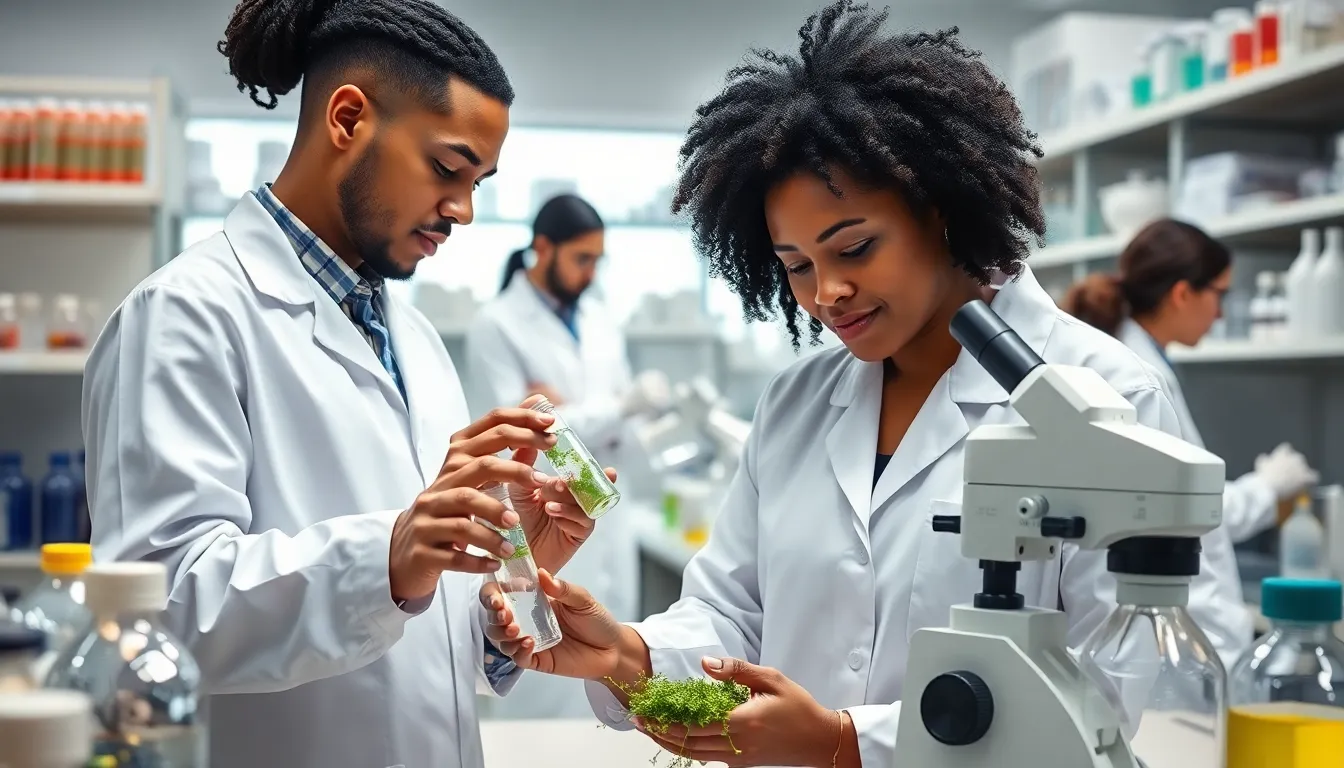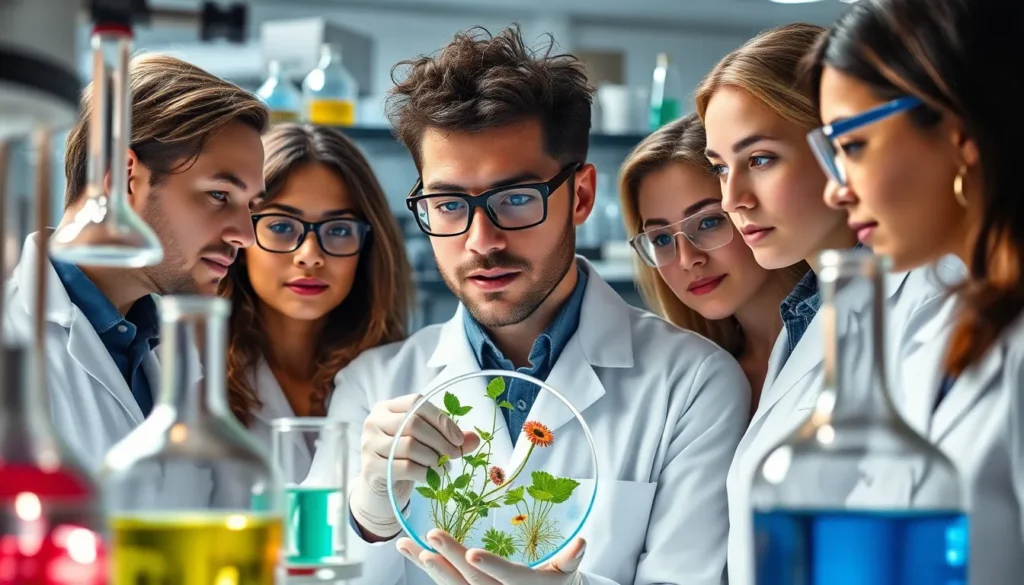Table of Contents
ToggleBiotech is the magical blend of biology and technology that’s transforming the world as we know it. Imagine a world where scientists play superhero, using tiny cells and genes to tackle everything from diseases to food shortages. It’s not just for mad scientists in lab coats anymore; biotech is revolutionizing industries and making life a whole lot easier.
What Is Biotech?
Biotechnology, often referred to as biotech, combines biological systems and organisms with technology to create products and services that enhance lives. It encompasses various disciplines, including genetics, molecular biology, biochemistry, and bioinformatics. This interdisciplinary approach enables the development of innovative solutions to challenges such as disease management and food security.
Biotech’s applications span multiple industries, including healthcare, agriculture, and environmental management. In healthcare, biotechnology facilitates drug development by using genetic engineering and cellular techniques. These methods lead to personalized medicine, targeting specific diseases more effectively than traditional therapies.
Agricultural biotech enhances crop resilience and yield through genetic modification. This technique allows the development of crops resistant to pests, diseases, and extreme environmental conditions. Additionally, biotechnology supports sustainable farming practices by reducing the need for chemical fertilizers and pesticides.
Environmental biotechnology focuses on the use of organisms to address environmental issues. Microorganisms can break down pollutants, contributing to soil and water remediation. Such processes play a crucial role in sustainable development goals, aiming to create a cleaner, healthier planet.
The impact of biotech extends beyond scientific research. It influences everyday life, from improved food quality to advanced medical treatments. As a result, biotech is revolutionizing industries and reshaping the way society addresses pressing global challenges.
The History of Biotechnology

Biotechnology has roots that extend back thousands of years, evolving significantly over time.
Early Developments
Ancient civilizations practiced forms of biotechnology through fermentation processes in bread and beer making. In 1865, Gregor Mendel’s experiments with pea plants laid the groundwork for genetics, showcasing inheritance patterns. The discovery of DNA’s structure by James Watson and Francis Crick in 1953 catalyzed further research. This revelation initiated the field of molecular biology, leading to improved understanding of genetic information. As researchers learned to manipulate biological systems, their work paved the way for significant advancements in agricultural practices and medical treatments.
Modern Advancements
Technological innovations have reshaped biotechnology since the late 20th century. The introduction of recombinant DNA technology in the 1970s sparked new possibilities for genetic engineering, allowing for the creation of targeted therapies and genetically modified organisms. Today, CRISPR-Cas9 technology offers precise gene-editing capabilities, revolutionizing biomedical research and therapeutic applications. Biotech is now integral to developments in personalized medicine, improving patient outcomes through tailored treatments based on genetic profiles. Emerging fields like synthetic biology further push boundaries, enabling the design of new biological parts and systems. Continuous advancements suggest a promising future for biotechnology as it addresses global challenges like disease prevention and sustainable food production.
Types of Biotechnology
Biotechnology encompasses various branches that address specific needs across multiple sectors. Each type plays a crucial role in advancing technology and improving lives.
Medical Biotechnology
Medical biotechnology focuses on developing treatments and therapies through the manipulation of biological systems. This branch leads to breakthroughs in drug development, gene therapy, and diagnostics. For instance, monoclonal antibodies treat diseases like cancer by targeting specific cells. Genetic engineering allows for personalized medicine, tailoring treatments based on an individual’s genetic makeup. Vaccines against infectious diseases, such as mRNA vaccines for COVID-19, illustrate biotech’s impact on public health. In tissue engineering, scientists create artificial tissues and organs, profoundly enhancing regenerative medicine.
Agricultural Biotechnology
Agricultural biotechnology aims to enhance food production and crop quality. Genetic modification techniques, such as CRISPR, enable scientists to develop crops resistant to pests and diseases. For example, Bt cotton incorporates a gene from the bacterium Bacillus thuringiensis, providing natural pest resistance. Biotechnology also improves nutritional content in staple crops, such as golden rice fortified with vitamin A. Sustainable farming practices emerge through biopesticides and biofertilizers, reducing reliance on chemical inputs. These advancements cultivate resilience against climate change, supporting global food security.
Industrial Biotechnology
Industrial biotechnology utilizes biological processes for manufacturing and production. This type streamlines the production of biofuels, chemicals, and materials using microorganisms. For instance, enzymes play a vital role in biofuel production, converting biomass into renewable energy sources. Biopolymers derived from natural materials replace conventional plastics, decreasing environmental impact. The fermentation process transforms raw materials into valuable products, such as pharmaceuticals or food ingredients. Moreover, industrial biotechnology promotes sustainability by minimizing waste and increasing resource efficiency.
Applications of Biotechnology
Biotechnology plays a vital role in various sectors, significantly impacting health, agriculture, and the environment.
Disease Treatment and Prevention
Biotechnology transforms disease treatment through the development of innovative therapies. Gene therapy serves as a prime example, aiming to correct genetic disorders by delivering healthy copies of genes. mRNA technology, highlighted during the COVID-19 pandemic, showcases rapid vaccine development tailored to specific pathogens. Additionally, monoclonal antibodies target diseases with precision, improving treatment efficacy. This approach to personalized medicine shifts the focus towards individual patient needs, enhancing responses to therapies and reducing side effects.
Crop Improvement
Crop improvement through biotechnology enhances food production and agricultural sustainability. Genetic modification techniques increase resistance to pests, diseases, and environmental stressors. Traits such as drought resistance enable crops to thrive in challenging climates, contributing to food security. Moreover, biotechnology facilitates the reduction of chemical usage by promoting natural pest resistance. High-yield crop varieties optimize production, helping meet the growing global food demand while preserving resources. These advancements ensure farmers can provide higher quality food with less environmental impact.
Environmental Solutions
Environmental biotechnology addresses pressing ecological challenges, utilizing living organisms for remediation. Microbial bioremediation effectively cleans contaminated soil and water, breaking down pollutants and restoring ecosystems. Biofuels, produced from biomass, reduce greenhouse gas emissions and offer sustainable energy alternatives. Techniques such as phytoremediation incorporate plants to absorb contaminants, enhancing soil health. Improved waste management practices through biotechnological innovations minimize landfill dependency and promote recycling. Each environmental application contributes to sustainable development goals, illustrating biotechnology’s crucial role in environmental conservation.
Ethical Considerations in Biotechnology
Ethical considerations in biotechnology play a crucial role in shaping policies and practices within the industry. Issues arise regarding the implications of manipulating life forms and balancing innovation with moral responsibilities.
Genetic Engineering
Genetic engineering presents ethical dilemmas, particularly concerning human gene editing. Manipulating genes raises questions about long-term effects and unintended consequences. Many advocate for the potential to eliminate genetic disorders, while others express concern about “designer babies” and social equity. Responsible approaches to genetic engineering require transparent public discourse and ethical frameworks that inform decision-making, prioritizing safety and fairness.
Regulatory Issues
Regulatory issues in biotechnology involve navigating complex policies that balance innovation and safety. Governments establish guidelines to ensure biotech products meet health and environmental standards. Debate continues over the adequacy of existing regulations, especially regarding genetically modified organisms (GMOs). Stakeholders emphasize the need for comprehensive risk assessments and public engagement to foster trust. Addressing these regulatory challenges ensures that biotechnology advances responsibly while maintaining safety for both consumers and the environment.
Biotechnology stands at the forefront of innovation, offering solutions that address some of the world’s most pressing challenges. Its ability to merge biological science with technology has led to breakthroughs that enhance health, agriculture, and environmental sustainability. As advancements continue to unfold, the potential for biotech to reshape industries and improve quality of life grows exponentially.
The journey of biotechnology from ancient practices to cutting-edge techniques illustrates its transformative power. Ethical considerations remain essential in this rapidly evolving field, ensuring that progress is made responsibly. The future of biotechnology promises not only to advance scientific understanding but also to foster a healthier and more sustainable planet for generations to come.




